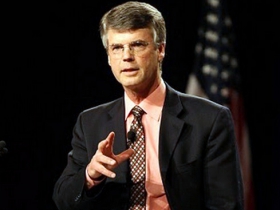Why the Appeals Court Slapped Down Conservatives
In John Doe case, the Republican-leaning court tossed out 7 suits against John Chisholm, and chastised Judge Randa. Why?
The recent decision by the federal 7th Circuit Court of Appeals in the John Doe investigation is a blow against frivolous lawsuits. The court dismissed all seven lawsuits brought by Eric O’Keefe and the #Wisconsin Club for Growth#. These suits all targeted the John Doe investigation of possible coordination between various conservative groups and Scott Walker’s campaign, including five suits that attempted to make individual prosecutors (like Milwaukee County District Attorney John Chisholm) and investigators personally liable.
If anyone doubts the appeals court regarded the suits as frivolous, its order that the defendants (Chisholm and company) recover their legal costs from O’Keefe and company leaves little room for doubt.
The appeals court had harsh words for federal judge Rudolph Randa’s decision in favor of O’Keefe and the Club for growth. It repeatedly rejected his legal reasoning, concluding the cases had no place in the federal courts and describing his injunction as “an abuse of discretion.”
A few days before the decision was announced, O’Keefe’s lead attorney David P. Rivkin, Jr., was forced by his partners at the Washington law firm of Baker Hostetler to withdraw from another high-profile suit, one brought by John Boehner accusing President Obama of overstepping his authority by delaying the employer mandate in the Affordable Care Act. The New York Times reported that Rivkin’s colleagues at Baker Hostetler feared he had taken on an “overly partisan lawsuit” which “could drive off potential clients and hurt Baker Hostetler’s credibility.” This suit led to a parody on the Tonight Show, with a fake commercial showing an ambulance-chasing lawyer and the line, “At Baker Hostetler, we specialize in one thing — suing the president.”
Other than its strong language, the decision was not surprising because the legal argument crafted by Rivkin and his colleagues ran directly counter to a series of Supreme Court decisions, as I discussed in a previous article. These decisions abolished most legal restrictions on spending by so-called “independent” groups (like O’Keefe’s) in political campaigns. As a result of these decisions the groups can raise unlimited dollars, with unlimited contributions by donors, and the groups don’t need to report who contributes or how much (although a strong court majority suggested Congress could require such reporting). Corporations can also contribute freely to these groups.
However these decisions still left in place two serious restrictions on independent groups:
- Their ads cannot say “vote for Smith” or “defeat Jones” or use any of the other “magic words” that explicitly endorse a candidate. To do so makes the ads “express advocacy” and leads to a requirement for a different kind of organization such as a political action committee (PAC), subject to contribution limits and reporting requirements.
- They cannot get together with a candidate or the candidate’s campaign staff to strategize over the message in their ads. Doing so would make the ads “in-kind” contributions to the campaign. The campaign would have to report the value of these ads, likely violating the legal limits on contributions by any individual or committee.
The rationale behind the second restriction was succinctly summarized by the appeals court:
Starting with Buckley v. Valeo, the Supreme Court has stated repeatedly that, although the First Amendment protects truly independent expenditures for political speech, the government is entitled to regulate coordination between candidates’ campaigns and purportedly independent groups. …. Buckley held that the Constitution allows limits on how much one person can contribute to a politician’s campaign. If campaigns tell potential contributors to divert money to nominally independent groups that have agreed to do the campaigns’ bidding, these contribution limits become porous, and the requirement that politicians’ campaign committees disclose the donors and amounts becomes useless. [For readability, in these quotes, I have dropped the courts’ citations.]
By coordinating the communication strategy with the campaign (as O’Keefe’s group and other conservative independent groups are accused of doing), the group’s ads become an “in-kind” contribution to the candidate. In effect the ads are similar to other in-kind contributions by the group, like buying pizza for Smith’s campaign staff, free rent in his building, or buying air time and donating it to the campaign.
In removing restrictions on spending by independent groups, the Supreme Court majority repeatedly refers to the ban on coordination as guarding against dangers from otherwise unlimited spending. For example, in this year’s McCutcheon decision removing laws limiting total contribution limits it says:
We have said in the context of independent expenditures that “ ‘[t]he absence of prearrangement and coordination of an expenditure with the candidate or his agent . . . undermines the value of the expenditure to the candidate.’ ”
In a case involving the Wisconsin Right to Life, where no coordination with a candidate was alleged, the Supreme Court expressed even stronger faith in the ability of the coordination ban to prevent corruption:
No one seriously believes that independent expenditures could possibly give rise to quid-pro-quo corruption without being subject to regulation as coordinated expenditures.
For the Supreme Court majority, lack of coordination allows the removal of other restrictions on political spending. At no point does the majority imply that the lack of coordination only applies to independent organization that practice express advocacy. Quite the contrary: the quotes about the absence of prearrangement and coordination all come in decisions removing restrictions on organizations that avoid express advocacy.
In his arguments in the John Doe cases, Rivkin repeatedly conflates the first restriction with the second, arguing that coordination is legal because the outside groups do not practice express advocacy. He does not reference any Supreme Court decision that took this position, presumably because he couldn’t find any.
Why does Rivkin make this elementary mistake? It seems unlikely he didn’t read the Supreme Court’s decisions on this issue. More likely is that he did, but decided to obfuscate in an attempt to fool the judges. He was successful for a time, as federal district court judge Randa clearly bought Rivkin’s argument:
It is undisputed that O’Keefe and the Club engage in issue advocacy, not express advocacy or its functional equivalent.
Judge Randa goes on to assert:
Coordination does not add the threat of quid pro quo corruption that accompanies express advocacy speech and in turn express advocacy money. Issue advocacy money… does not go directly to a political candidate or political committee for the purpose of supporting his or her candidacy. Issue advocacy money goes to the issue advocacy organization to provide issue advocacy speech. A candidate’s coordination with and approval of issue advocacy speech, along with the fact that the speech may benefit his or her campaign because the position taken on the issues coincides with his or her own, does not rise to the level of “favors for cash.” Logic instructs that there is no room for a quid pro quo arrangement when the views of the candidate and the issue advocacy organization coincide.
In addition to misrepresenting the US Supreme Court’s position on coordination as only applying to express advocacy, Rivkin argues that Wisconsin law makes coordination between a candidate’s campaign and an outside group legal so long as express advocacy is avoided:
…under Wisconsin law, campaign finance regulation is predicated on communication being for a “political purpose,” …. a term of art … predicated on the communication expressly advocating the election or defeat of a clearly identified candidate.
One problem with this argument is that is not what Wisconsin law says:
An act is for “political Purposes” when it is done for the purpose of influencing the election …. of any individual …. or influencing the recall …. of an individual holding state or local office …. Acts which are for “political purposes” include but are not limited to:
1. The making of a communication which expressly advocates the election, defeat, recall or retention of a clearly identified candidate ….
In short the law targets any act with a political purpose, including but not limited to express advocacy.
In a 1999 case, Wisconsin Coalition for Voter Participation, the Wisconsin Court of Appeals rejected the same arguments made by Rivkin in his briefs. Here is how he handles that speed bump in his brief to the 7th Circuit:
Wisconsin Coalition for Voter Participation, Inc. v. State Elections Board… is the only exception. That case interprets Wisconsin’s “political purposes” limitation to turn not on the distinction between issue and express advocacy but on the kind of intent- and circumstances-based inquiry that WRTL held to violate the First Amendment. … That may explain why WCVP hasn’t been cited in a reported decision in over a decade.
This implies that Wisconsin Appeals Court decisions, like lettuce, have a freshness date and must be thrown out if they get old, rather that they continue in effect until challenged or the law changes. More likely, the WCVP case hasn’t been cited because it hasn’t been challenged.
Like Judge Randa, Wisconsin Judge Gregory Peterson outsourced his interpretation of the law to Rivkin, citing the need for speed and a belief that whatever he decided was unlikely to stick:
The motions were filed over two months ago, before I was even assigned this case. They are overdue for a decision. This decision will be brief, enabling me to produce it more quickly. Any reviewing court owes no deference to my rationale, so giving the parties a result is more important that a delay to write a lengthy decision on election and constitutional law. For more detail, readers should consult the parties’ briefs.
Wisconsin Club for Growth#’s analysis of the campaign financing statutory scheme is particularly helpful. ….. the only clearly defined political purpose is one that requires express advocacy. The State is not claiming that any of the independent organizations expressly advocated. Therefore, the subpoenas fail to show probable cause that a crime was committed.
Why was Rivkin’s campaign to mislead the judges over the content of the Supreme Court’s decision so successful? In Peterson’s case, one cause may have been excessive modesty over his ability to interpret the decisions and a reluctance to challenge a big-time Washington lawyer. He could, for example, have asked Rivkin to point to a specific passage in which the court majority said that the ban on coordination applied only to express advocacy.
Judge Randa seems to have been an easy mark because he wanted to believe Rivkin’s story. His opinion makes it very clear he strongly identified with O’Keefe. He also seems to strongly identify with Justice Clarence Thomas, the one justice who seems willing to drop the ban on coordination, and through some leap of logic Randa convinced himself that Thomas’ concurring opinion in McCutcheon represented the opinion of the court. But as the 7th Circuit pointed out, “Justice Thomas wrote separately in McCutcheon, precisely because a majority was unwilling to revisit that aspect of Buckley.” The 7th Circuit’s take-down of Randa’s decision must sting. Whether this experience will make him more reluctant in the future to accept Rivkin’s unsourced arguments remains to be seen.
Given the Supreme Court’s faith that the the ban on coordination will prevent corruption and the belief by the four justices in the minority that more, not less, regulation of money in politics is needed, it seems unlikely a move to remove the ban or restrict it to cases of express advocacy would gain the support of any of Justice Thomas’ colleagues. If anything, the removal of other restrictions could be viewed as making the ban more necessary.
Indeed, a cynic might suggest that campaigns and independent groups have become adept at hiding their tracks. A more optimistic interpretation is that they have taken to heart the advice of the state GAB to avoid situations that even suggest coordination.
What comes next? Rivkin reacted defiantly to the appeals court decision, telling the Journal Sentinel he would ask the 7th Circuit to “correct this mistaken opinion.” If this means he intends the full court to take up the case the math is against him. Six of the eight judges not on the panel would have to agree.
Appealing to the US Supreme Court is another possibility, but the chance of success seems remote. Only Thomas has shown a willingness to throw out the ban on collaboration between candidates and outside groups. Rivkin would have to convince four other justices that the ban they have repeatedly described as preventing corruption is not so important after all. Misrepresenting the justices’ own decisions does not seem a likely route to success.
The main action now moves to the Wisconsin court of appeals. The most logical action would be for the court to affirm its decision in Wisconsin Coalition. Rivkin is unable to point to any changes in either Wisconsin law or Supreme Court decisions that would invalidate the Coalition decision.
If the case gets to the Wisconsin Supreme Court all bets are off. According to the Wisconsin Democracy Campaign the same groups targeted by the investigation spent $1 million or more supporting each of four of the seven members in their most recent elections. Will those judges recuse themselves? We’ll see.
Data Wonk
-
Life Expectancy in Wisconsin vs. Other States
 Dec 10th, 2025 by Bruce Thompson
Dec 10th, 2025 by Bruce Thompson
-
How Republicans Opened the Door To Redistricting
 Nov 26th, 2025 by Bruce Thompson
Nov 26th, 2025 by Bruce Thompson
-
The Connection Between Life Expectancy, Poverty and Partisanship
 Nov 21st, 2025 by Bruce Thompson
Nov 21st, 2025 by Bruce Thompson






















Thanks Bruce for a very good and needed analysis. I found the section on Judge Gregory Peterson to be particularly interesting. Whenever I read about Eric O’Keefe’s and the Wisconsin Club for Growth, I think of this quote from G. K. Chesterton: “The poor object to being governed badly, while the rich object to being governed at all.”